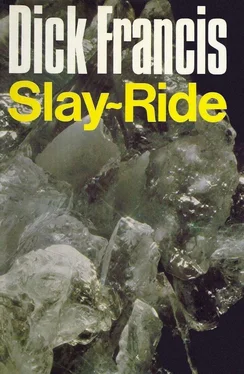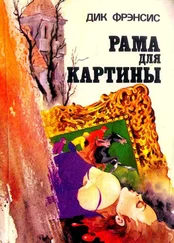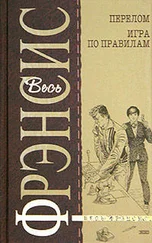Time passed.
‘David...’
‘Yes?’
‘I’ll have to tell you,’ he said.
I took a deep breath. It felt icy in my lungs.
‘Go on,’ I said.
He paused again. Then he said, ‘I was talking to Bob at the races. He laughed and told me it was all fixed, Arne was going to drive him to the airport afterwards and pay him extra for the package.’
He stopped.
I waited.
His voice went on, hesitant but at last committed.
‘By the end of the races it was dark. I went out to the car to wait for my father. He is often late because of being on the committee. I sat in the car and waited for him. I hadn’t talked to him at all at the races. I usually don’t see him much there. He’s always busy.’
He stopped again. His breathing grew heavier, more disturbed.
‘Most of the cars went. Then two people came past and in some passing headlights I saw they were Bob and Arne. I was going to call out to them... I wish I had... but I couldn’t get the window down fast enough... and then they were over by Arne’s car. They were talking face to face. I could only see them now and then, you see, when car lights pointed that way as people went home. But I saw another man walk up behind Bob and raise his arm. He held something shiny... Then he brought it down...’
He stopped. Gulped a bit. Went on. ‘The next time I could see, there were only two people there. I thought... I couldn’t believe ... And then one of them turned and came towards our car. I was scared...’
He shuddered violently.
‘But he just opened the boot and threw into it something which clinked, and then he got into the driving seat, and he was smiling.’
A long pause.
‘Then he saw me sitting there, and he looked absolutely astonished. And he said... he said... “Mikkel! I’d forgotten you were at the races.”’
His voice was full of pain.
‘He’d forgotten me. Forgotten me.’
He was trying not to cry.
‘My father,’ he said. ‘My father killed Bob Sherman.’
We went down to Finse at first light, him sliding easily on his skis, me scrunching and slipping in my city shoes. If I looked anything like he did I had blue grey circles round my eyes, hollows at the corners of my mouth, and a certain overall air of extreme weariness.
He had said little more during the night. He had rolled his head on to my shoulder at one point and fallen ex-haustedly asleep, and in the early morning, when he stirred, he had been calm and apparently untroubled, as if the final unburdening of the horror he’d lived with through eight long weeks had set him quietly free.
I left him with the warm comforting people of Finse, and went up the mountain again with several local men. This time I went on skis, shuffling along inexpertly up the slope. They waited for me, making jokes. They had cheerful faces, carefree smiles. And the sun came wanly through the clouds, the first time I’d seen it in Norway.
We reached the hut and went on past it, up beyond where the path petered out into a flat field of snow. Two of the men were pulling a sleigh, a lightweight affair sliding easily on ski-like runners; just like the one old Berit has, they said.
Brown eyes was lying face down in the snow.
Dead.
But he hadn’t died from gunshot wounds: or not primarily. He’d died from exposure and cold.
The men from Finse looked in silence at the trail leading away behind his body. He’d been pulling himself along, crawling. The snow where he’d been was streaked black with his blood.
They wrapped him in canvas, put him on the sleigh, and turned to go to Finse.
‘I’ll go that way,’ I said, pointing to where brown eyes hid come from.
They nodded, consulted, and sent a man with me, as they didn’t trust my rudimentary ability on skis.
We followed the blood-stained trail up a shallow slope and on to a sort of plateau whose far edge was a smooth horizon against a pale grey sky. The trail ended in a jumble of tracks which the man from Finse rapidly interpreted.
‘This is where he was shot. See the blood. There was another man with him.’ He pointed to a set of ski marks setting off at a tangent across virgin snow. ‘That man is an expert cross country skier. He went fast. He left the other man lying wounded in the snow. He did not come back with help. If he had, he could have followed the trail of blood.
Yellow eyes had just upped and left. But Knut would find him in the end.
‘The two men came across to here skiing fast and easily,’ my guide said, and pointed to tracks stretching away across the plateau.
‘There are other tracks over there,’ he said, turning to his right and stretching out a well gloved hand.’
‘Let’s look,’ I said.
We went over.
‘Two men,’ he said, ‘Pulling a loaded sleigh.’
Although I expected it, it hit in my gut.
‘They came that way,’ I said, pointing back towards the hut.
He nodded. We went back along the trail until we found the marks of Mikkel’s skis beside it.
‘The boy came to here. Stopped. Then he turned and went back. You can see from his tracks that he was disturbed when he came. And panic stricken when he left. Look at the depth and the sharpness and the small steps.’
‘We might find the cartridges,’ I said.
He nodded. We looked for a while and found both of them, bright orange cylinders on the snow.
‘And now...’ I gestured ahead along the trail which Mikkel had been following: two men and a loaded sleigh.
The marks ran regularly across the plateau towards the horizon. We followed.
The horizon proved to be not the end of the world, but the brow of a hill. Down the other side the slope was steep, short, and sharp edged, and far beyond it, mile upon mile, lay a vista of snow-scattered peaks. We were standing at the top of the cliffs above the lake where Berit lived.
The marks of the two men on skis stopped at the brow of the hill, and turned back.
The sleigh marks ran on straight and true to the edge.
‘I want to go down there,’ I said, and unclipped my skis.
My guide didn’t like it, but produced a rope from round his waist. He tied me to it, and paid it out foot by foot, standing four square and solid at the top of the slope.
I went down slowly in my borrowed boots, finding the snow surprisingly glassy and having to be careful not to slide. Having to concentrate, too, on not feeling giddy, and finding it as difficult as ever. When I stood at length on the edge I could see all the lake stretching away, with Berit’s house a crimson blob far down to the left.
Beside my feet the marks of the runners looked shallow and crisp, speaking of speed. And they ran on without pity, pointing straight out into space.
The drop in front was six hundred feet, perpendicular. The ruffled green water lay secretively below. Nothing else Nothing to see.
Arne, I thought. Flying through the air on a sleigh, down to his death.
Arne... who didn’t look over his shoulder the one time the enemy was really there.
Arne, my treacherous friend.
You would have sworn that round the snowy cliffs you could hear crashing chords of Beethoven echoing in the wind.



